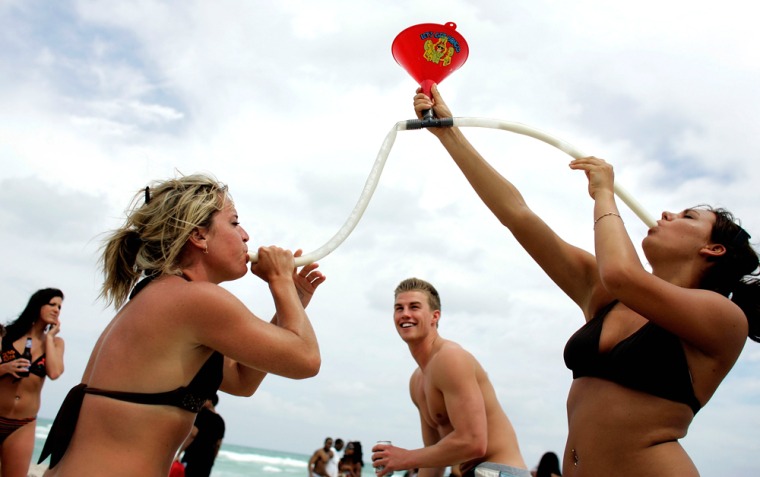A few years back, I was waiting in line at the Brussels train station when a frantic young man started pushing his way toward the ticket counter. His excuse for cutting in front of everyone was “Man, my backpack just got ripped off! My train pass, my plane ticket and my passport are in there. I need help.”
“Hey! American college kid!” shouted a woman behind me who’d somehow instantly and correctly pegged the young man as a student on spring break, “The train guys can’t help you. Find the embassy. Call your momma. And next time, don’t leave your stuff with the ‘nice guys’ in the park outside the station.”
Welcome to the real world
Getting stuff stolen by “helpful” strangers seems to be almost as much of a rite of spring break as getting badly sunburned and hung over. Unfortunately, each year there are also reports of vacationing students who experience much worse. While trying to out-party their friends, some students drown in oceans, pools or hot tubs and overdose on drugs or alcohol. Others get arrested for drunk driving, public intoxication or drug possession. And some end up getting mugged, kidnapped, raped or murdered.
Of course, terrible things can — and sometimes do — happen to travelers who aren’t on spring break. But spring break trips, with their party-hardy agendas, often leave the doors wide open for disaster. Which is why I was pleased last week when Melissa Zamora at the South Padre Island Convention and Visitors Bureau told me that keeping spring break visitors safe was high on the town’s annual “to do” list.
Why pick on college kids?
Everyone needs a safety plan when they’re out on the road. This goes double — maybe triple — for spring breakers because the pursuit of beach and booze can impair decision-making skills, not to mention drunken college students make easy targets.
So listen up, students: Here’s a five-point refresher course to help you stay safe this spring break.
1. Don’t make assumptions about the safety of your hotel
Check in to any American hotel, and you'll likely find the American Hotel & Lodging Association’s 11-point list of safety tips on the hotel’s TV channel or printed out on the back of the key card envelope. Review and follow those tips, but don’t assume everyone who works at your hotel is up to speed on even those basic security measures.
The downtown Austin, Texas, hotel I’m currently staying at, for example, has safety tips posted on the TV, on the key card, in the elevators and in the exercise room. Yet no one bothered to ask for my identification when my key-card got demagnetized and I asked a desk clerk to reset it.
2. Follow age-old safety tips — and learn some new ones
Safety tips distributed by tourist bureaus, tour operators and law enforcement agencies generally mimic the common sense tips outlined by the American Hotel & Lodging Association: “Don’t open your door to strangers,” “Make sure your windows and sliding doors are locked,” etc.
Many college Web sites expand this tip list for students heading out for spring break. The College of Charleston, for example, reminds students that there’s a “difference between making new friends and allowing yourself to be alone with a stranger.” And the University of West Florida highlights a significant upside of volunteering to be a designated driver: “It’s always more entertaining to watch people act the fool rather than to be one.”
3. Use your study skills
American students spending spring break in another country should learn a few key phrases in the language of their destination country (“Please,” “Thank you,” and “Call the police,” for starters) and study the country-specific advice on the U.S. State Department’s Web site.
Among the warnings about popular spring break destinations in Mexico, the Bahamas, Belize and Jamaica, the site notes that “Americans have been badly injured or have been killed in automobile accidents, falls and other mishaps. Many of these incidents are related to alcohol or drug use. Other Americans have been sexually assaulted or robbed because they found themselves in unfamiliar locales, or were incapable of protecting themselves because of drug or alcohol use, or because they were the victim of a ‘date rape’ drug.”
Scary? You bet. Not scary enough to deter, for example, more than 8,000 students from visiting Jamaica on their own during spring break each year. But scary enough to convince the Jamaican government and its tourist board to beef up security in the resort areas during high profile events such as the JAMFEST concert series in Negril.
4. Share your notes
It may seem so high school, but college students on spring break must make sure someone at home has copies of all paperwork (plane tickets, hotel reservations and credit card numbers) and details of a spring break travel itinerary. And sorry, but “I’ll be in Mexico staying with some of my roommate’s friends” doesn't suffice.
5. Stay with your group
Many heartbreaking spring-break stories involve late-night muggings and the sexual assault of women who are intoxicated or drugged. So it’s important that women — and men — heading out to party stick together, identify well-lit routes back to their hotel rooms, agree on the “please butt in” and “you’ve had enough to drink” signals, and understand why it’s important to make sure their drinks are never left unattended. For more safety tips see RAINN’s anti-sexual assault Web site.
And, of course, never leave your backpack with those “nice guys” in the park.
